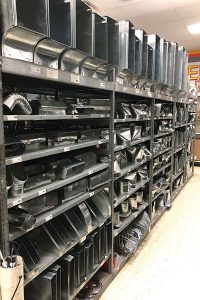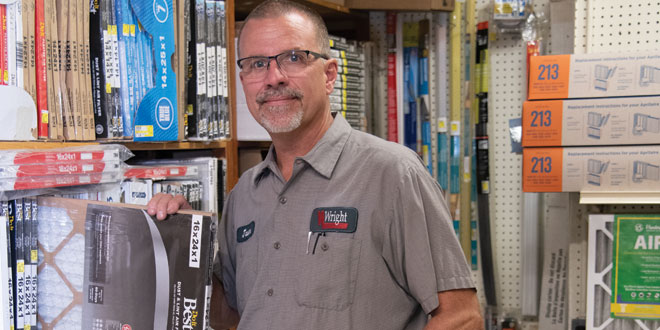Certain departments in hardware stores attract customers more easily than others. Who doesn’t want to look over the latest smoker for the backyard or the most advanced drill for the toolbox? But a category like heating, ventilation and air conditioning (HVAC) is more about necessity than it is selling your customers on the latest trends.
There are a broad range of HVAC components that retailers can stock, whether they serve the casual DIYer who needs a new air filter or the professional HVAC servicer who installs new units. Some retailers may even take on the service or installation role themselves as a complementary business to their hardware operation.
That is the case in Colfax, Indiana, where Jason Wright serves as vice president of Wright Hardware Co., a group of family businesses in the area. The family operates Wright Hardware, an independent hardware store. They supply heating propane gas to homes and businesses and offer repair services on HVAC equipment.
Debbie Supply in East Rochester, New York, started as a wholesale plumbing supply business for area plumbers. The family operation eventually evolved to focus more on heating and air conditioning equipment in addition to hardware. Owner Mark Barbero has been in the business since he was a teenager, initially working on the company’s HVAC service crews before taking over management of the store.
While servicing HVAC equipment is often a job for a professional, independent home improvement retailers who specialize in the category can be a vital resource for professionals and DIYers. Retailers who provide any combination of HVAC services, products and knowledge can lead customers to rely on their local home improvement store for HVAC supplies and information.
Heat Up Your Product Mix

When it comes to HVAC, there are certain hard boundaries for what DIYers shouldn’t do. Knowledgeable retailers can educate their customers about the HVAC servicing they can do themselves and when to call a professional.
For example, the refrigerant chemicals present in many air conditioning units can pose risks to consumers who attempt DIY repairs, and in some places, it may be illegal to handle them without proper certification. DIY repairs on heating units can also be dangerous if a home is using natural gas or propane to generate heat.
Wright Hardware and Debbie Supply either have in the past or currently employ certified HVAC service technicians. That service remains a large part of Wright Hardware’s overall business, while Debbie Supply now prioritizes referring customers to trusted service technicians.
Operating both a hardware store and an HVAC repair service means Wright often leans toward recommending his company’s own repair technicians, but the company also works with customers who want to complete their own projects and maintenance to keep their homes safe and comfortable. In any case, stocking air filters for heating equipment is a must, Wright says.
Barbero points to his selection of air filters as a major contributor to Debbie Supply’s reputation as an HVAC supplier. Barbero examined the HVAC equipment brands that were most popular at the local wholesale stores where professionals shop for units.With that information, he was able to stock the corresponding filter brands and have enough in each variety to fit any local need.
In addition to HVAC-specific products, Wright also recommends retailers stock products that can improve home climates without turning on the AC or heat. He suggests spray foam insulation as a key product for keeping a home warm in the winter.
Both Wright and Barbero agree that with most HVAC equipment becoming digital, diagnosing equipment isn’t as much of a problem. Yet repair work is still a task for professionals in most cases.
“In older units, a homeowner might have been able to change a belt drive and oil the motor, but there have been so many changes that it’s gotten beyond most customers’ skill sets,” Wright says. “We carry a lot of equipment for pros looking to handle repairs, but those parts aren’t designed for someone just hoping to open up a heater and find a problem.”
Wright Hardware offers service plans to help consumers stay on top of equipment maintenance. A technician visits twice a year to check HVAC equipment, change air filters and clean the unit. Should the unit require more involved repairs, customers receive a discount on those supplies. Technicians who source from Wright Hardware get a wholesale rate, which means the customer gets a good price on those products, too.
Going Pro

Given the challenging nature of HVAC repairs, Debbie Supply gears most of its retail product availability toward maintenance items like air filters. The business also serves local contractors with the equipment they would need when out on a service call, these including ignitors, electric blower motors and transformers. Debbie Supply distinguishes itself by having the right equipment for every job. There are nearly 60 different ignitors in stock to fit the rating exactly for different heaters.
For other equipment, such as electric motors, Barbero says there are models on the market that will fit up to 80 percent of heaters. He suggests retailers look for these kinds of universal items if they are considering going deeper into the HVAC category.
“We learn a lot about product selection from both homeowners and contractors,” Barbero says. “What brands are they seeing in the field? Which air filters work best with those brands and models? That’s how you build a reputation and keep customers coming back.”
Debbie Supply has earned its HVAC reputation by stocking the variety of supplies that a wholesaler would have while also providing the customer service of an independent retail location.
“A wholesaler is going to charge you a fee just to open the doors on a weekend,” Barbero says. “We have everything a pro needs to repair an air conditioner or a heater, so even if we’re a few dollars more than a wholesaler might be, we’re the more attractive option for a quick supply run.”
Our technicians have specific training because they need to be competent repair technicians, but we’re all here to serve the customer. —Jason Wright, Wright Hardware
Wright Hardware has acquired deep inventory reserves by devoting its HVAC department to products from a single manufacturer. Since Wright has just one lineup, every piece of equipment in the store is designed to work together, making it easier to service equipment and to stock the retail store.
“We like to remain loyal because that develops a relationship with the company and it makes the job easier for our technicians,” Wright says. “They’ve worked on the same equipment countless times, so they get very proficient at it.”
Hear more about Wright Hardware Co.’s professional services business here.
Don’t Chill on Training

There are a number of ways to develop skilled employees in the HVAC category, from initial certification to ongoing training.
Trade organizations dedicated to the heating or air conditioning trade offer certifications, Barbero says. After Debbie Supply employees earn the required certifications, the company then relies on local wholesale supply companies for annual training to keep its employees up to date on new features for products or best practices when dealing with HVAC equipment.
One resource that has helped Debbie Supply employees assist customers is a flowchart Barbero found online. The chart walks employees through questions to ask customers about their HVAC equipment. As the customer answers each question, it offers either another test for more information or the likely diagnosis. Using this flowchart, employees can help a customer in the store or even over the phone.
“It’s important to stay current on the equipment, which is why each year I send our people to our wholesaler’s training sessions. But there are certain skills that are more about helping the customer and figuring out their needs than technical knowledge,” Barbero says.
Wright Hardware often recruits its technicians from area community colleges and vocational schools. These centers grant the necessary technical certifications, and Wright Hardware oversees any specific training for the equipment it stocks once an employee is on board.
Wright Hardware has four technicians as well as three employees devoted to propane gas delivery and four dedicated to the hardware store. The entire staff is trained on customer service and the POS system, Wright says, to keep the staff as well rounded as possible.
“We’re big on helping each other out and being able to step into whatever role is needed,” Wright says. “Our technicians have specific training because they need to be competent repair technicians, but we’re all here to serve the customer, whether on a service call or on the salesfloor.”
 Hardware Retailing The Industry's Source for Insights and Information
Hardware Retailing The Industry's Source for Insights and Information








